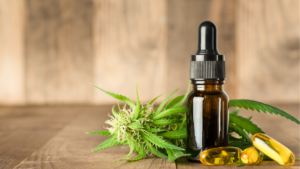Cannabidiol (CBD), extracted from Cannabis Sativa, has been well-researched for its many benefits and is quickly becoming a favorable therapeutic option as adverse effects are limited, it does not cause psychoactive effects, and it lacks abuse potential. Included in the growing list of well-studied benefits, are the pharmacological properties of CBD that may protect the liver. This is due, in part, to the antioxidant and anti-inflammatory capabilities.
Here we will discuss CBD’s potential role in restoring liver function, in alleviating liver injuries in alcoholics, and as an anti-cancer therapy.
Restoring liver function
CBD is being more closely looked at for benefits in individuals suffering from hepatic encephalopathy (HE), a syndrome observed in those with end-stage liver disease and exacerbated by inflammatory responses. Given the novel anti-inflammatory and non-intoxicating properties of CBD, it makes it a promising treatment for HE.
For one study in particular, researchers injected mice with acute liver injury, which raised their levels of ammonia, bilirubin, and liver enzymes after administration. CBD partially restored all of the indices induced by the injection to normal levels, therefore restoring liver function. For the control animals who did not receive injections, CBD had no effect on any of the liver-associated levels.
Alleviating liver injuries in alcoholics
Alcohol abuse and high-fat diet-induced liver diseases are among the most prevalent chronic liver diseases as well as the leading reason for liver transplantation around the world. Inflammation has an important role in the formation and progression of liver damage that may be induced by either alcohol or a high-fat diet.
Published research in 2021 looked to CBD to further study its ability to alleviate liver injuries induced by ethanol plus high-fat cholesterol diets, a model simulating heavy alcohol drinkers in a Western diet. This study took place over a span of 8 weeks with mice liver injury models.
Results found that CBD ameliorated steatohepatitis (liver inflammation and damage caused by a buildup of fat in the liver), alleviated oxidative stress, decreased hepatic inflammation, prevented key activations responsible for the development of liver diseases, and attenuated liver inflammatory responses.
Anti-hepatocellular carcinoma potentials
Hepatocellular carcinoma (HCC) represents over 85% of primary liver cancers. Liver cancer is the 5th most common cancer in men and 9th most common for women worldwide. It is estimated that 70% of liver cancers may be prevented.
Researchers sought to understand the efficacy of Cannabis sativa, specifically an extract with major components delta-9-tetrahydrocannabinol (THC), CBD, and cannabinol (CBN) with percentages at 16.26%, 14.98%, and 13.486% respectively. Clinical trials and observational studies have, for many years, shown the safety of cannabis administration in the treatment of therapies. Therefore researchers in this study wanted to build upon that anti-cancer knowledge.
The cannabis sativa extract increased the activity of antioxidant enzymes, ameliorated lipid peroxidation, displayed anti-angiogenic potential, lead to apoptosis, and demonstrated anti-inflammatory benefits.
Conclusion
While benefits are being realized in regards to understanding CBD as a protectant of liver function, more research is needed, especially in the arena of CBD use in combination with pharmaceuticals. As with any therapy, effective dosing varies widely by individual and condition. When looking to cannabis for medical conditions, we always recommend speaking with a healthcare professional. However, if you are in need of support while on your journey, the care team at Realm of Caring is here to help! Send an email to [email protected], call at 719-347-5400 or schedule an appointment.





